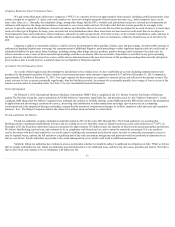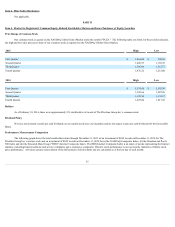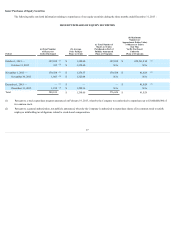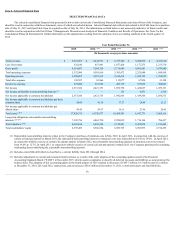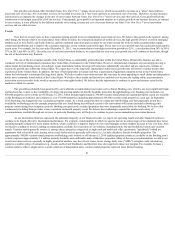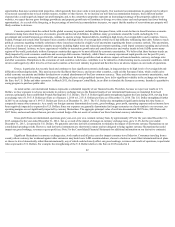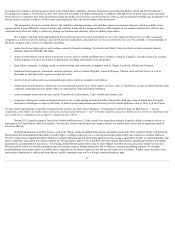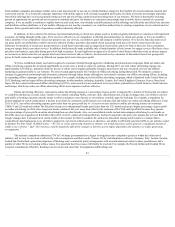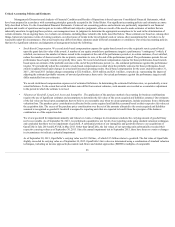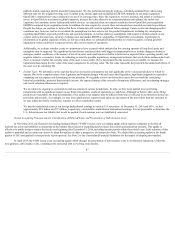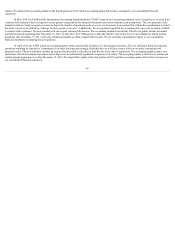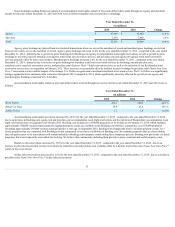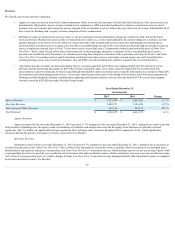Priceline 2015 Annual Report Download - page 45
Download and view the complete annual report
Please find page 45 of the 2015 Priceline annual report below. You can navigate through the pages in the report by either clicking on the pages listed below, or by using the keyword search tool below to find specific information within the annual report.
opportunities than non-vacation rental properties, which generally have more units to rent per property. Our non-hotel accommodations in general may be subject
to increased seasonality due to local tourism seasons, weather or other factors. As we increase our non-hotel accommodation business, these different market
characteristics could negatively impact our profit margins; and, to the extent these properties represent an increasing percentage of the properties added to our
websites, we expect that our gross bookings growth rate and property growth rate will continue to diverge over time (since each such property has fewer booking
opportunities). As a result of the foregoing, as the percentage of non-hotel accommodations increases, we expect that the number of reservations per property will
likely continue to decrease.
Concerns persist about the outlook for the global economy in general, including the European Union, with recent declines in broad Eurozone economic
indicators raising fears about the pace of economic growth and the risk of deflation. In addition, many governments around the world, including the U.S.
government and certain European governments, continue to operate at large financial deficits, resulting in high levels of sovereign debt in such countries. Greece,
Ireland, Portugal and certain other European Union countries with high levels of sovereign debt at times have had difficulty refinancing their debt. Failure to reach
political consensus regarding workable solutions to these issues has resulted in a high level of uncertainty regarding the future economic outlook. This uncertainty,
as well as concern over governmental austerity measures including higher taxes and reduced government spending, could impair consumer spending and adversely
affect travel demand. At times, we have experienced volatility in transaction growth rates and cancellation rates and weaker trends in hotel ADRs across many
regions of the world, particularly in those European countries that appear to be most affected by economic uncertainties. We believe that these business trends are
likely impacted by weak economic conditions and sovereign debt concerns. Similarly, while China's economy experienced rapid growth over the past 20 years,
growth of the Chinese economy slowed in 2015 and concerns about its future growth have had an adverse impact on financial markets, currency exchange rates
and other economies. Disruptions in the economies of such countries could cause, contribute to or be indicative of deteriorating macro-economic conditions, which
in turn could negatively affect travel to or from such countries or the travel industry in general and therefore have an adverse impact on our results of operations.
Greece, in particular, has recently faced and continues to face significant economic challenges, in large part due to its high levels of sovereign debt and
difficulties refinancing that debt. This may increase the likelihood that Greece, and in turn other countries, could exit the European Union, which could lead to
added economic uncertainty and further devaluation or eventual abandonment of the Euro common currency. These and other macro-economic uncertainties, such
as sovereign default risk becoming more widespread, declining oil prices and geopolitical tensions, have led to significant volatility in the exchange rate between
the Euro, the U.S. Dollar and other currencies. In March 2015, the European Central Bank, in an effort to stimulate the European economy, launched a quantitative
easing program to purchase public debt.
As noted earlier, our international business represents a substantial majority of our financial results. Therefore, because we report our results in U.S.
Dollars, we face exposure to adverse movements in currency exchange rates as the financial results of our international businesses are translated from local
currency (principally Euros and British Pounds Sterling) into U.S. Dollars. The U.S. Dollar significantly strengthened against the Euro during 2014, moving from
an exchange rate of 1.38 U.S. Dollars per Euro as of January 1, 2014 to 1.21 U.S. Dollars per Euro as of December 31, 2014. The U.S. Dollar strengthened further
in 2015 to an exchange rate of 1.09 U.S. Dollars per Euro as of December 31, 2015 . The U.S. Dollar also strengthened significantly during this time frame as
compared to many other currencies. As a result, our foreign currency denominated net assets, gross bookings, gross profit, operating expenses and net income have
been negatively impacted as expressed in U.S. Dollars. Since our expenses are generally denominated in foreign currencies on a basis similar to our revenues, our
operating margins are not significantly impacted by currency fluctuations. The aggregate principal value of our Euro-denominated 2022 Notes, 2024 Notes and
2027 Notes, and accrued interest thereon, provide a natural hedge of the net assets of certain of our Euro functional currency subsidiaries.
Gross profit from our international operations grew year-over-year on a constant currency basis by approximately 28% for the year ended December 31,
2015 compared to the year ended December 31, 2014 , but, as a result of the impact of changes in currency exchange rates, grew 11.6% for the year ended
December 31, 2015 , as reported in U.S. Dollars. We generally enter into derivative instruments to minimize the impact of short-term currency fluctuations on our
consolidated operating results. However, such derivative instruments are short term in nature and not designed to hedge against currency fluctuations that could
impact our gross bookings, revenues or gross profit (see Note 5 to the Consolidated Financial Statements for additional information on our derivative contracts).
Significant fluctuations in currency exchange rates, stock markets and oil prices can also impact consumer travel behavior. Consumers traveling from a
country whose currency has weakened against other currencies may book lower ADR accommodations, choose to shorten or cancel their international travel plans
or choose to travel domestically rather than internationally, any of which could adversely affect our gross bookings, revenues and results of operations, in particular
when expressed in U.S. Dollars. For example, the strengthening of the U.S. Dollar relative to the Euro in 2015 resulted in it
42



